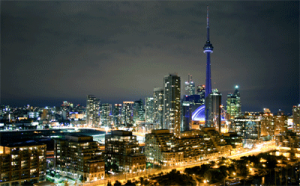Alex Saunders —
Whether you’re a supporter of the various moves to allow a casino in Toronto or not, it’s undeniably strange that what is likely to become the biggest online poker concern in the world is listed on the stock exchange of a city where you can’t go and play a live game in a casino.

Merger
David Baazov is an Israel-born, Montreal-raised businessman. At just 33 years of age, he’s recently steered his company, Amaya Gaming, towards the US$5 billion acquisition of PokerStars and Full Tilt Poker, two of the internet’s biggest gambling sites.
Amaya has been listed on the Toronto Stock Exchange for four years, and recently Baazov stated that, since the merger, he’s been considering listing the company on either the New York or London exchanges as well. With a Canadian company about to become one of the biggest poker outfits on the planet, are anti-casino campaigners in Toronto in for another round of arguments?
Poker In Toronto
At the moment, poker fans in Toronto who want to play anywhere other than round the kitchen table have a couple of choices. They can either log on to a legal site like www.gamingclub.com/ca, which at least has the advantage of allowing people to play for free; or travel out of the city to elsewhere in Ontario, like Casino Rama in Orillia, around an hour and a half’s drive away.

Toronto Mayor Rob Ford
It’s over a year since Toronto City Council voted against bringing a bricks-and-mortar casino to the city, after a further year of wrangling over the issue. Rob Ford’s support for the idea may now seem like a gift to the anti-casino lobby, as stories of the troubled mayor’s rocky rehab sessions emerge.
No Campaign
“No Casino Toronto” operated on a comparatively tiny budget during the campaign, and argued that not only would the building of a casino have negative social impacts, but also that the amount of tax revenues raised wouldn’t be enough to justify those impacts. In the end, just 2 out of 21 councilors voted in favor of the idea.
US market
In the end, Amaya’s merger with PokerStars is likely to affect the US market more than Canada’s. As part of the buyout, some executives who had unresolved legal issues in the US have left the firm, and, as liberalization of US online gaming gradually starts to spread across states, it’s likely that Baazov will be eyeing those markets primarily. There’s no doubt that the Toronto question will re-emerge in due course; the pressure for jobs alone would suggest so. But whether enough support can be gained for a Toronto mega-casino next time around remains to be seen.
(Images courtesy of wikipedia, cbc.ca)
 TheBulletin.ca Journal of Downtown Toronto
TheBulletin.ca Journal of Downtown Toronto

